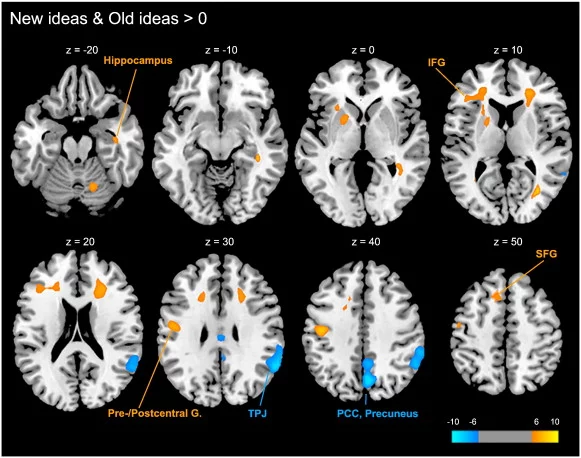The human brain has always been a fascinating subject of research, with countless mysteries that science has yet to fully unravel. One of the most interesting questions scientists are trying to answer is how the brain stores and organizes new ideas. Recently, an important study has helped us better understand this process, shedding light on how the brain processes and retains the concepts we learn.
In a recent study, a team of scientists at Columbia University conducted experiments to explore how the human brain remembers new concepts. 16 participants were taught about the diets and living environments of eight extinct animal species. The goal of the study was to understand how the brain processes information and identify where these new concepts are stored.
Using functional magnetic resonance imaging (fMRI), the research team discovered that when participants learned about these animals, each new concept formed a “unique activation pattern” in their brains. This means that the brain remembers each new idea by creating a distinct activation pattern, much like a fingerprint for each concept.

“What was surprising is that new concepts in the brain create distinct activation patterns. We could identify which animal the participant was thinking about just by observing the activation patterns in their brain,” the researchers shared in a study published in Nature Neuroscience (2023).
The study’s results showed that concepts related to similar environments, such as animals living in forests, had very similar activation patterns. This proves that our brains do not store information randomly, but rather have a mechanism for organizing and grouping concepts based on shared characteristics. This may explain why we can easily remember information that is closely related to each other.
Interestingly, once a new concept is learned, it remains stable in the brain, even when other concepts are learned afterward. This suggests that the information we learn is not just temporary memory, but can be retained in the brain in a lasting way. Even when new concepts are introduced, the previously learned information remains firmly established in the brain.
“Once a concept is learned, it sticks to the brain and is not erased, even when new concepts continue to form.” — Researchers, Columbia University (Nature Neuroscience, 2023)
This discovery offers a new perspective on how the brain organizes and retains information, while also opening opportunities to develop technologies that could help us “read” the thoughts of others. In the future, functional imaging technologies like fMRI could be used to support the treatment of memory disorders, such as amnesia or issues related to storing and retrieving information in the brain.
Additionally, this study provides valuable insight into the durability of what we learn. Concepts are not only learned once but are “engraved” in the brain over time, helping us easily recall and connect previously learned information.
This could help explain why we can remember old knowledge clearly for a long time, even when new information has no direct connection to what was learned previously. The brain is not merely a storage place for information; it is a complex system that helps us organize and maintain what we have learned.
With these advancements, scientists hope to develop even more advanced technologies to “read” and understand how the brain processes and remembers information, leading to new methods of treatment for memory and cognitive disorders. Such research not only expands our understanding of the brain but also promises important applications in medicine and technology.


HPX24h > Science > Science Uncovers the Brain’s Process of Storing New Ideas
Top Reads from This Category
Science
Regrowing Adult Teeth in Just 9 Weeks: Science Turns the Impossible into Reality
Science
New Hope for the Blind: A Breakthrough in Retinal Implant Technology
Science
New Discovery: How the Brain Manages Emotions and Memory
Science
Your Body Is Not the Same as It Was 10 Minutes Ago: The Continuous Regeneration Process of the Human Body
Science
Direct Brain-to-Brain Communication via the Internet
Science
Successful Penis Transplant Surgery: A New Breakthrough in Medical Science
Science
Innate Intelligence: What Role Do Genetics Play in Developing High IQ
Discover New Topics
Healthy Eating
Why Is Nutrition Research So Complex?
Healthy Eating
Vegan Diet: An Effective Weight Loss Solution or a Nutritional Challenge?
Fitness
Effective And Safe Methods To Strengthen Your Knees: Proven Tips For Optimal Performance
Science
Work 3.5 Days a Week and Live to 100: This Could Be Your Future
Healthy Eating
Sugar-Free Diet: Benefits, Risks, and What You Need to Know
Parenting Tips
Why Your Child Might Be Coughing Disruptively During Sleep?
Science
Laser Therapy Could Help Regrow Your Teeth – Did You Know?
Science
Implanting an NFC Chip into the Hand – When Technology and Humans Merge
Animals
Stickleback Fish’s Secret to Adapting from Saltwater to Freshwater: How Genetic Mutations Enable Remarkable Adaptation
Science
The Secret of the Bee Brain: New Technology Enables Drones to Fly Independently
Space
Scientists Discover Dark Galaxy Located 10 Billion Light-Years from Earth
Healthy Eating
Why Do We Crave Sweets? A Scientific Perspective on Food Cravings
Fitness
Swimming: The Golden Key to Physical and Mental Well-Being